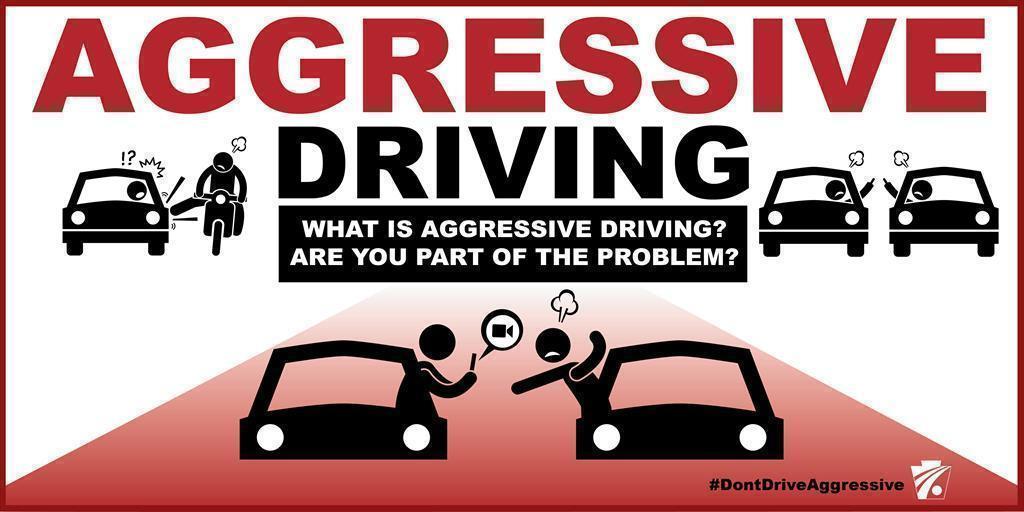
WHAT IS AGGRESSIVE DRIVING?

Aggressive driving is defined by the National Highway Traffic Safety Administration as the behavior of an individual who "commits a combination of moving traffic offences to endanger other persons or property."
Speeding and other aggressive driving behaviors are among the leading causes of highway crashes and fatalities in Pennsylvania, however, many motorists don’t realize they're an aggressive driver.
ARE YOU AN AGGRESSIVE DRIVER?
- Do you speed excessively?
- Do you tailgate slower vehicles?
- Do you race to beat red lights or run stop signs?
- Do you weave in and out of traffic?
- Do you pass illegally on the right?
- Do you fail to yield the right of way to oncoming vehicles?
If you answer yes to any of these questions, you may be an aggressive driver and are putting yourself, your passengers and other people on the road at increased risk of a crash.
AGGRESSIVE DRIVING EDUCATION AND ENFORCEMENT PROJECT
To deter aggressive drivers and make Pennsylvania's highways safer for all who use them, PennDOT partners with Pennsylvania State and local police departments to conduct aggressive driving enforcement. Since the project was launched in 2006, more than 580 roadways have been targeted with additional enforcement and education. Learn more about the project here.
TIPS FOR WHAT TO DO WHEN YOU ENCOUNTER AGGRESSIVE DRIVERS

If you encounter an aggressive driver, PennDOT offers these tips for what to do:
- Get out of their way and don't challenge them.
- Stay relaxed, avoid eye contact and ignore rude gestures.
- Don't block the passing lane if you are driving slower than most of the traffic.
- Do not attempt to follow or pursue the vehicle. You or a passenger may call the police. But, if you use a cell phone, pull over to a safe location. If possible, give the dispatcher the following information: vehicle description, license plate number, location and direction of travel, driver description, and the aggressive driving behavior being demonstrated.
For more information on aggressive driving, visit www.penndot.gov/safety. Join the conversation on social media by using the hashtag #DontDriveAggressive. Follow PennDOT on Facebook, Twitter, and Instagram.
ABOUT THIS BLOG
Did you know PennDOT is directly responsible for nearly 40,000 miles of highway and roughly 25,000 bridges? We oversee programs and policies affecting highways, urban and rural public transportation, airports, railroads, ports and waterways, in addition to administering the state's more than 11 million vehicle registrations and 8.8 million driver's licenses.
So, how do we do what we do? And how can we help you travel in Pennsylvania — whether it be for business or leisure — in safe and enjoyable manner? Read PennDOT Way to learn more about the department, what we do, and how and why we do it.
TAGS
50-Year Anniversary, 511PA, Aggressive Driving, Airports, Autonomous Vehicles, Bicycles, Bridges, Child Safety, Community Relations, Construction, COVID-19, Distracted Driving, District 1, District 10, District 11, District 12, District 2, District 3, District 4, District 5, District 6, District 8, District 9, DOTcom, Driver and Vehicle Services, Emergency Responders, Employment, Equity, FAQ Friday, Human Trafficking, Impaired Driving, Innovations, Live Free Ride Alive, Maintenance Monday, Motorcycles, Older Drivers, PA Motorcycle Safety Program, Pedestrians, PennDOT Connects, Ports, Public Transit, Railroads, REAL ID, Road MaP, Roadside Beautification, Rural Roads, Safety, School Buses, Seat Belts, State Transportation Innovation Council (STIC), Sustainability, Teen Drivers, Throwback Thursday, Transportation Funding, Travel in PA, Welcome Centers, Winter, Work Smart, Work Zone, Yellow Dot
LATEST POSTS
PennDOT Continues Sharing, Updating Resources for Local Governments to Pursue Bipartisan Infrastructure Law Funding Opportunities
Norwin High School Wins 2024 ‘Innovations Challenge’
Demo Complete: I-95 CAP Project in Center City Philadelphia
PennDOT Archeologist Connects Past, Present, and Future
Lehigh Valley DUI, Highway Safety Task Force Hosts Law Enforcement Seminar
ARCHIVES
2024
2023
2022
2021
2020
2019
2018
2017

